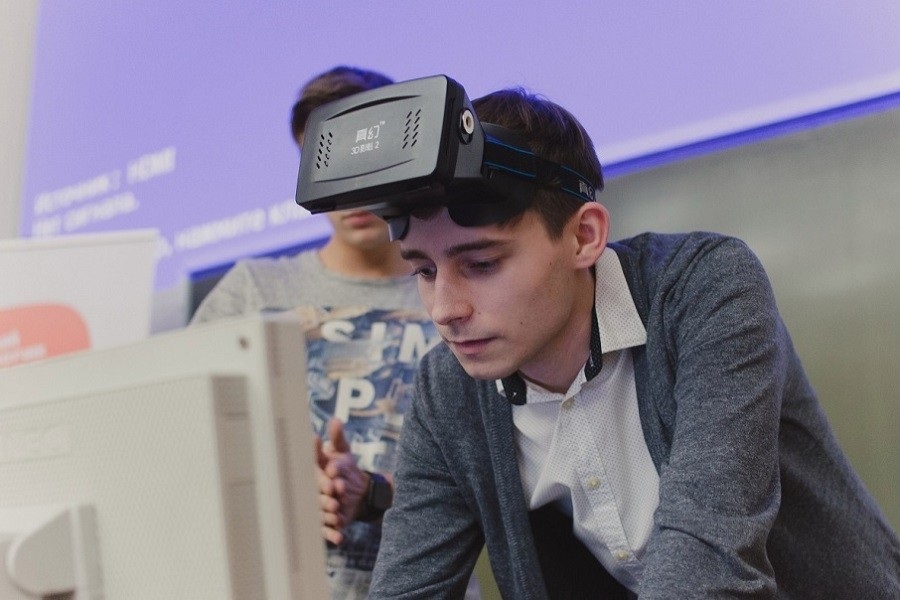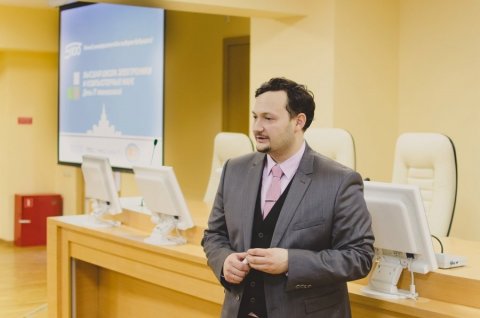Programmer is one of the most in-demand professions at the modern stage of society development. Specialists in the sphere of programming, who got a degree at South Ural State University, build their careers in the world’s leading companies. Director of the School of Electrical Engineering and Computer Science Gleb Radchenko told us about training of software developers at SUSU.
— What is the role of programmers nowadays?
— Nowadays, programmer is a person who can have influence on destinies of a large number of people: help them, make their lives much easier. Basically, all programmers are working in order to make our world more comfortable, interesting and nice. These people, in fact, define the environment we live in. All of us use mobile phones, surf the Internet, like spending time watching movies or playing computer games. These things would be impossible without informational technology, computers and, of course, programmers. Because every program in, say, smart phones has been once developed and is constantly being improved and maintained by a big team of software developers.
— What spheres of programming are the most prevailing nowadays?
— Presently, there is actually a wide range of programming spheres. We can’t say that one of them is super-prevailing and another one is not – one cannot exist without the other. But we should note that nowadays smart phones win over personal computers. At the moment, for majority of people, the only computer that they use is their own phone. Today each smart phone is a computer of either medium or high performance. And therefore, development of mobile applications is an extremely important task, and specialists of this sphere surely don’t sit around doing nothing.
If we are to talk about the industry, about manufacture, we are surely living in the world of the fourth industrial revolution, when manufacture is switching for the so-called Internet of Things approach, and programmers are essential here. They solve problems connected with collection and analysis of information contained in high-performance computing systems, deal with the so-called data mining and data analytics.
Development of web applications is also a very topical sphere of activity, as all of us use Internet. And, of course, computer games are a huge business; a very big number of our alumni are working in companies like Unity Technologies, which is the key developer of platforms for computer games development.
— What specialists in the sphere of programming are trained in the School of Electrical Engineering and Computer Science?
— School of Electrical Engineering and Computer Science performs training of software developers of practically every specialisation. We perform training of system programmers, who work on development of the so-called back-end, - the platforms which support complex computational infrastructures; we perform training of specialists who develop high-performance computing applications and efficiently work with “cloud’ systems. Our alumni can work not only with software but with hardware as well; they know how to program the so-called embedded systems, such as Arduino or the systems of the Internet of Things. Also, we perform training of specialists in the sphere of informational security, because information protection and programming are inextricably connected with one another. We also have specialists in the sphere of industrial automation, which is also an essential task in the sphere of programming.

— What teaching methods are used for training programmers?
— Among the most interesting methods, I could name project-based learning, which has been introduced this academic year. For example, outstanding projects will be developing at the Department of System Programming. They are to be elaborated upon orders from our key employers, in particular, the Magnitogorsk Iron & Steel Works. Also, students will be implementing projects within a program of the Internet of Things Academy of Samsung Company.
The second interesting teaching method is Programming Olympiad that we are developing. This year, we established a Centre of Programming Olympiad at the Department, to which we attract our students. The School of Electrical Engineering and Computer Science organizes multiple annual championships in programming at SUSU, and the best teams take part in all-Russian and international competitions. This really is a very interesting sport, and our students, who proved themselves in such Championships, receive very good offers from their future employers from Russia and abroad.
Also, our students take part in hackathons – the forums of developers, who gather up in groups and solve specific problems within limited time. For example, SUSU organizes Global Game Jam – the hackathon in computer games development, when a team has to determine a theme, develop software product and present it, all within 48 hours. We are also planning to launch an Internet of Things hackathon on the basis of the Laboratory of Samsung Academy. This is very interesting for both students and teaching staff, because such format allows reviewing the entire cycle of software and hardware system’s development within a short period of time. All this is performed in the framework of teamwork, featuring not only programmers but also equipment operators, artists, designers, scriptwriters, operators, sound engineers, and the others. Hackathons attract employers as well; they like taking part in such events as mentors, helping students and telling them to what they should pay attention.
— In what companies can alumni of the School of Electrical Engineering and Computer Science work?
— Today I can’t name a single company which would not require good programmers. We constantly receive requests from various companies, starting with Makfa, which needs automation specialists and industrial programmers, and finishing with SKB Contur, Napoleon IT, TurboRender, etc. Alumni of the School of Electrical Engineering and Computer Science work in such large companies as Yandex, Google, Microsoft, and Intel. Having completed their study in a specialty connected with software development, our alumni don’t go searching for a job – the job is searching for our alumni.
— Do EECS students have the possibility to obtain a degree in another country?
— We have been implementing the double degree program with Lappeenranta University of Technology in Finland for the fourth year already. Students, who get enrolled for master’s degree studies at the EECS, can submit an application, improve their English and pass the selection stage. During the first year, the student studies at SUSU, during the second year – in the partner university. At Lappeenranta University of Technology, students can choose one out of two spheres of study: software engineering or machine vision. The student who got admissions for the program, writes master’s thesis and defends it first in Lappeenranta, and then at SUSU. Upon completion of master’s studies, the student receives two degrees. Alumni of the program indeed possess very high qualification level, because they get an experience of studying both in Russia and abroad. All of them get employed to leading companies related with machine vision and artificial intelligence.
— How are the university’s material and technical resources used for training specialists?
— Our key partner is the Supercomputer Centre of SUSU; almost all of its employees are teaching staff or students of the School of Electrical Engineering and Computer Science. All of our students have access to the Personal Virtual Computer system. They get partial access to supercomputer and can launch applications that are needed for their studies. The students who carry out research in the sphere of high-performance systems are granted access to virtual machines in order to carry out research and write graduation qualification works. We have a big number of laboratories related to applied aspects of programming. They are the Endress+Hauser and Emerson Laboratories for Industrial Automation, and the Kaspersky Laboratory Research and Education Centre for information protection. We are planning to open Laboratory for machine learning and mobile applications development.
All these facilities are available for students of the School of Electrical Engineering and Computer Science. And we are always happy when they show initiative and come up with their proposals. They apply for grants, win contests and obtain financial support for development of their inventions. For example, Ivan Volkov, our student, created a mobile application for keeping a records journal for people with diabetes, and now it is one of the most in-demand applications in App Store and Google Play. That means that he developed a competitive product which is needed for a big number of people, and, as a programmer, he made the world a bit better.




